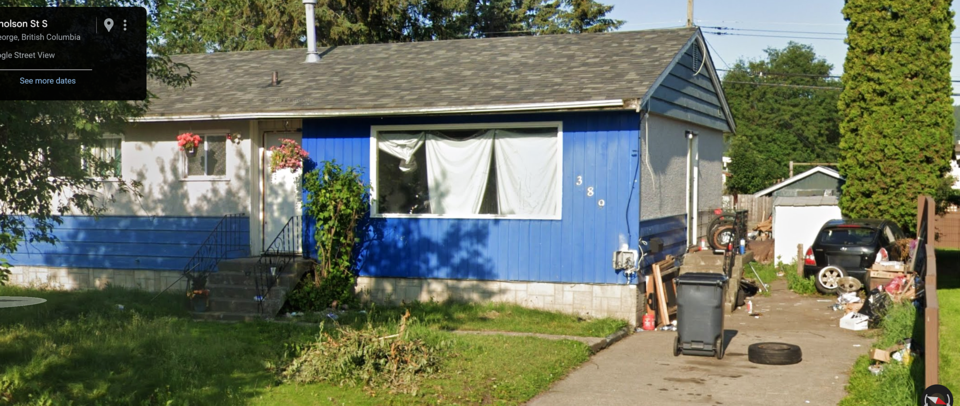The city has a warning for owners of nuisance properties that draw the attention of the police, firefighters and city bylaw officers.
Clean up your act or else it will cost you money.
City council at Monday’s public meeting at city hall unanimously approved a staff recommendation to issue a written order to Leah Rose Dubois and Brian Joseph Dubois, owners of a house at 389 Nicholson St. South, to immediately cease causing or allowing to be caused the following nuisance activities:
- Discarding and accumulating garbage outdoors;
- Allowing dogs to run at large;
- Yelling, shouting, screaming and fighting;
- Lighting outdoor fires.
Acting on complaints from neighbours, city bylaw services has attended the house 17 times since 2019. Each time, the complaint was substantiated and determined to be a nuisance.
Since 2018, when the city’s nuisance property bylaw took effect, Prince George RCMP has been called 128 times to 389 Nicholson.
While most of those calls are related to complaints of shouting, screaming and fighting, the house has also been tied to police investigations of assaults, forcible confinement, drug trafficking and on two occasions RCMP recovered stolen vehicles from the property.
Concerns of neighbours that it was being used as a drug house were further substantiated when three separate search warrants of the house resulted in seizures of fentanyl, methamphetamines, cocaine and firearms.
It is not a rental property. Bylaw Services suspects that frequent illegal drug sales and consumption on the property are resulting in nuisance activities.
Eric Depenau, the city’s director of administrative services, said the problem house is “a strong example” of why the nuisance abatement bylaw was written in 2018. Depenau also said the situation at the residence appears to be deteriorating further.
“In this case, 128 (police visits) since 2018, I just wish this would have come to us sooner but I know there is a process,” said Coun. Brian Skakun. “I really feel for the people in that area that have had to put up with these complaints and some of them are serious and some not so serious but if you look at the total amount of complaints it’s not fair to them.
“This bylaw was brought in so we can take some of these folks on and that’s what we’re doing tonight. I’m hoping they listen. The calculator or clock is going to start ticking and the costs are going to go up because 128 times the RCMP visited, probably that would be a couple officers each time an hour there and back so that’s 100 bucks an hour, so it’s going to add up. We have to clean up some of these places.”
Under terms of the nuisance abatement bylaw, which took effect in February 2018, the city defines a nuisance as "any activity which substantially and unreasonably interferes with a person’s use and enjoyment of a highway, park or other public area or of land a person owns or occupies.”
That would include such activities as a loud party, loud music, car racing, shouting, screaming, fighting, foul odours and accumulation of water or other liquids on a property under the city's definition.
If the nuisance activities do not stop, despite the order issued to Leah and Brian Dubois, the city has the right to recover the cost of abating the nuisance or causing the nuisance to be abated.
The city can use its discretion to impose costs of a nuisance incident on a tenant or landlord. Based on the hourly rate of emergency and/or bylaw enforcement personnel called to the scene, the costs could range from $55 to $111 per hour. Costs incurred would be added to the owner’s property tax bill.
Council also discussed a nuisance property at 1105 Vancouver St., which had numerous complaints from neighbours since 2018 about garbage including mattresses and cardboard left on the property; yelling, shouting screaming and fighting and lighting of outdoor fires that were attended three times by Prince George Fire Rescue.
The house, a rental property owned by Jamanak Singh Manhas, Mohinder Kaur Manhas, Ram Singh Manhas and Sudershan Kumari Manhas, has had several different tenants since 2018, the latest of whom were served eviction notices on July 15.
The tenants were evicted after a bylaw officer spoke to Ram Manhas on Aug. 20 and explained he had one month to address the reasons for bylaw officers' visits. On Aug. 29, a bylaw officer spoke to Kap Manhas, the son of Ram Manhas, who stated the owners intend to tear the house down and do a complete renovation.
The same bylaw officer visited the house to do an inspection on Sept. 22 and found the house boarded up with a sign posted to indicate the contents of the building have been thrown away and anyone found trespassing would be arrested.
Council directed a written order be issued to the owners warning they would be liable for financial consequences if future nuisance abatements are required.
However, council was satisfied the actions of the owners to evict the nuisance tenants and clean up the property will solve the problem.
“I appreciate the work the property owner is doing to bring this into compliance with the bylaw, I think it’s admirable,” said Coun. Cori Ramsay. “I understand because they are doing this work they are seeking to have (the warning) recommendation to not proceed. I tend to take the opinion that this is an insurance policy for us, if the good behaviour prevails and there are no calls to the property then the property owner won’t experience any consequences. However, if this continues to be a burden on taxpayers, who are quite frankly funding the calls for service to properties that do have nuisance behaviour, then I do think it should be charged back to the property.”



